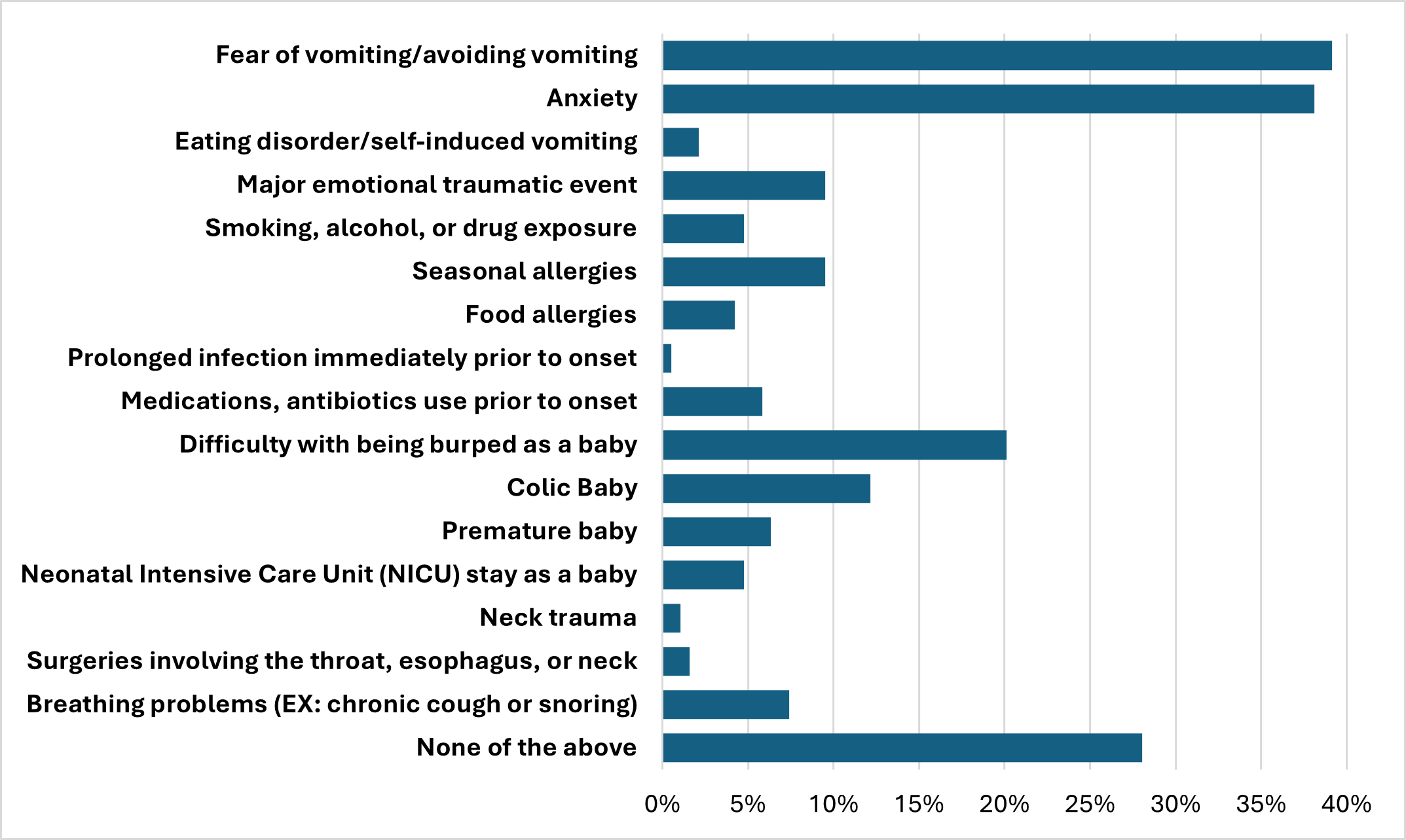Monday Poster Session
Category: Esophagus
P2762 - Early Life Experiences Prevalent in Retrograde Cricopharyngeus Dysfunction
Monday, October 27, 2025
10:30 AM - 4:00 PM PDT
Location: Exhibit Hall

Jason N. Chen, MD (he/him/his)
University of Texas Health San Antonio
San Antonio, TX
Presenting Author(s)
Jason N.. Chen, MD1, Cassidy Swain, BS1, Arham Siddiqui, MD1, Duke Appiah, PhD2, Sandeep Patel, DO1
1University of Texas Health San Antonio, San Antonio, TX; 2Texas Tech University Health Sciences Center, Lubbock, TX
Introduction: Retrograde Cricopharyngeus Dysfunction (R-CPD) describes the inability of the cricopharyngeus muscle to relax, preventing burping. Current literature focuses on manifestation and treatment, but its etiology and associated risk factors are unclear. There is evidence that suggests early life onset and familial prevalence, but it is unknown whether this condition is inherited or acquired. Neonatal conditions have been linked with early esophageal motor dysfunction. The purpose of this study is to explore early-life experiences of those who have this condition, which may identify risk factors and thus improve early detection and prevention.
Methods: This is an exploratory survey-based study utilizing Qualtrics to gather data from the subreddit group “r/noburp,” a growing community focused on R-CPD. Adults aged 18 years and older who experienced at least one cardinal symptom of R-CPD reported experiences felt early in childhood as well as general characteristics of their condition. Descriptive statistics were used to report proportions of the outcomes of interest.
Results: A total of 211 adults qualified for analysis, with a mean age of 31 years old and 27%/69% male/female distribution. The most commonly reported early-life experiences were emetophobia (39%) and anxiety (38%), followed by difficulty being burped as a baby (20%). Other notable factors included colic (12%), seasonal allergies (10%), and major childhood trauma (10%) (Figure 1). Notably, 28% reported none of the experiences listed. A family history of R-CPD was reported by 29%, most often involving a sibling with similar symptoms.
Discussion: This study identifies potential early-life risk factors prevalent in R-CPD. High rates of emetophobia and anxiety suggest a possible neurobehavioral component, while 20% reporting difficulty being burped as infants may indicate early sphincter dysfunction. These features may seem similar to patterns seen in conditions like dyssynergic defecation, where behavioral and muscular discoordination contribute to symptoms. The presence of colic and seasonal allergies raises the possibility of a broader hypersensitivity pattern. A notable 29% reported a family history, supporting a possible genetic predisposition. However, 28% reported no early-life factors, suggesting inconsistencies in disease origin. These findings support the need for further research into genetic and early-life contributors to R-CPD to inform early diagnosis and possible prevention.

Figure: Figure 1. Percent of respondents reporting each early life experience.
Disclosures:
Jason Chen indicated no relevant financial relationships.
Cassidy Swain indicated no relevant financial relationships.
Arham Siddiqui indicated no relevant financial relationships.
Duke Appiah indicated no relevant financial relationships.
Sandeep Patel indicated no relevant financial relationships.
Jason N.. Chen, MD1, Cassidy Swain, BS1, Arham Siddiqui, MD1, Duke Appiah, PhD2, Sandeep Patel, DO1. P2762 - Early Life Experiences Prevalent in Retrograde Cricopharyngeus Dysfunction, ACG 2025 Annual Scientific Meeting Abstracts. Phoenix, AZ: American College of Gastroenterology.
1University of Texas Health San Antonio, San Antonio, TX; 2Texas Tech University Health Sciences Center, Lubbock, TX
Introduction: Retrograde Cricopharyngeus Dysfunction (R-CPD) describes the inability of the cricopharyngeus muscle to relax, preventing burping. Current literature focuses on manifestation and treatment, but its etiology and associated risk factors are unclear. There is evidence that suggests early life onset and familial prevalence, but it is unknown whether this condition is inherited or acquired. Neonatal conditions have been linked with early esophageal motor dysfunction. The purpose of this study is to explore early-life experiences of those who have this condition, which may identify risk factors and thus improve early detection and prevention.
Methods: This is an exploratory survey-based study utilizing Qualtrics to gather data from the subreddit group “r/noburp,” a growing community focused on R-CPD. Adults aged 18 years and older who experienced at least one cardinal symptom of R-CPD reported experiences felt early in childhood as well as general characteristics of their condition. Descriptive statistics were used to report proportions of the outcomes of interest.
Results: A total of 211 adults qualified for analysis, with a mean age of 31 years old and 27%/69% male/female distribution. The most commonly reported early-life experiences were emetophobia (39%) and anxiety (38%), followed by difficulty being burped as a baby (20%). Other notable factors included colic (12%), seasonal allergies (10%), and major childhood trauma (10%) (Figure 1). Notably, 28% reported none of the experiences listed. A family history of R-CPD was reported by 29%, most often involving a sibling with similar symptoms.
Discussion: This study identifies potential early-life risk factors prevalent in R-CPD. High rates of emetophobia and anxiety suggest a possible neurobehavioral component, while 20% reporting difficulty being burped as infants may indicate early sphincter dysfunction. These features may seem similar to patterns seen in conditions like dyssynergic defecation, where behavioral and muscular discoordination contribute to symptoms. The presence of colic and seasonal allergies raises the possibility of a broader hypersensitivity pattern. A notable 29% reported a family history, supporting a possible genetic predisposition. However, 28% reported no early-life factors, suggesting inconsistencies in disease origin. These findings support the need for further research into genetic and early-life contributors to R-CPD to inform early diagnosis and possible prevention.

Figure: Figure 1. Percent of respondents reporting each early life experience.
Disclosures:
Jason Chen indicated no relevant financial relationships.
Cassidy Swain indicated no relevant financial relationships.
Arham Siddiqui indicated no relevant financial relationships.
Duke Appiah indicated no relevant financial relationships.
Sandeep Patel indicated no relevant financial relationships.
Jason N.. Chen, MD1, Cassidy Swain, BS1, Arham Siddiqui, MD1, Duke Appiah, PhD2, Sandeep Patel, DO1. P2762 - Early Life Experiences Prevalent in Retrograde Cricopharyngeus Dysfunction, ACG 2025 Annual Scientific Meeting Abstracts. Phoenix, AZ: American College of Gastroenterology.
